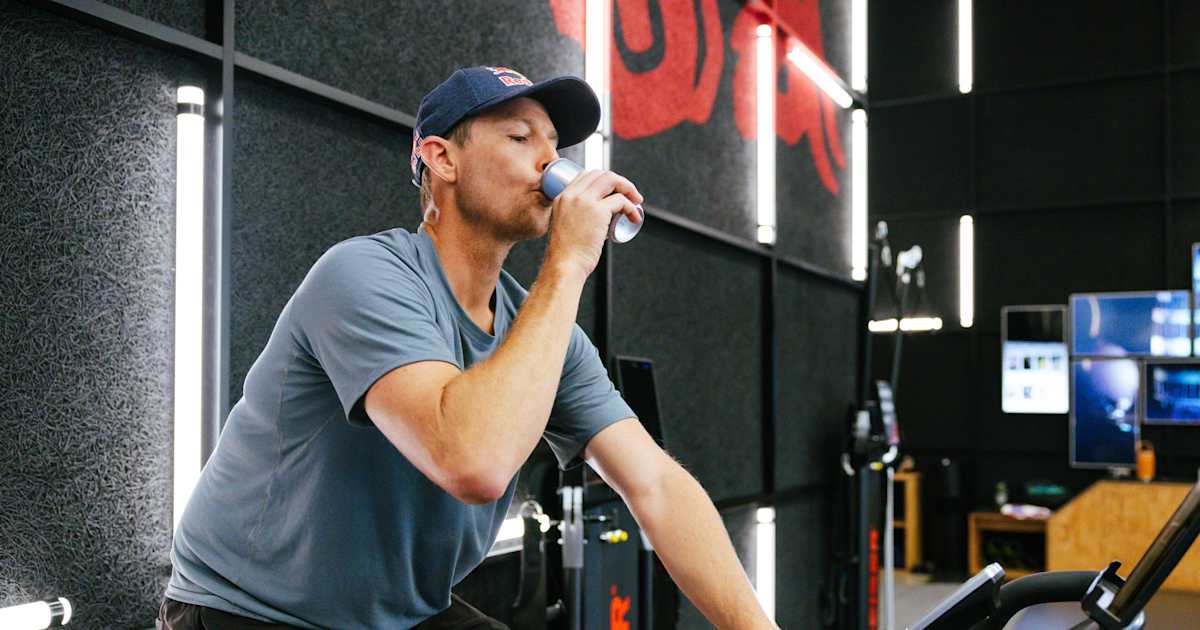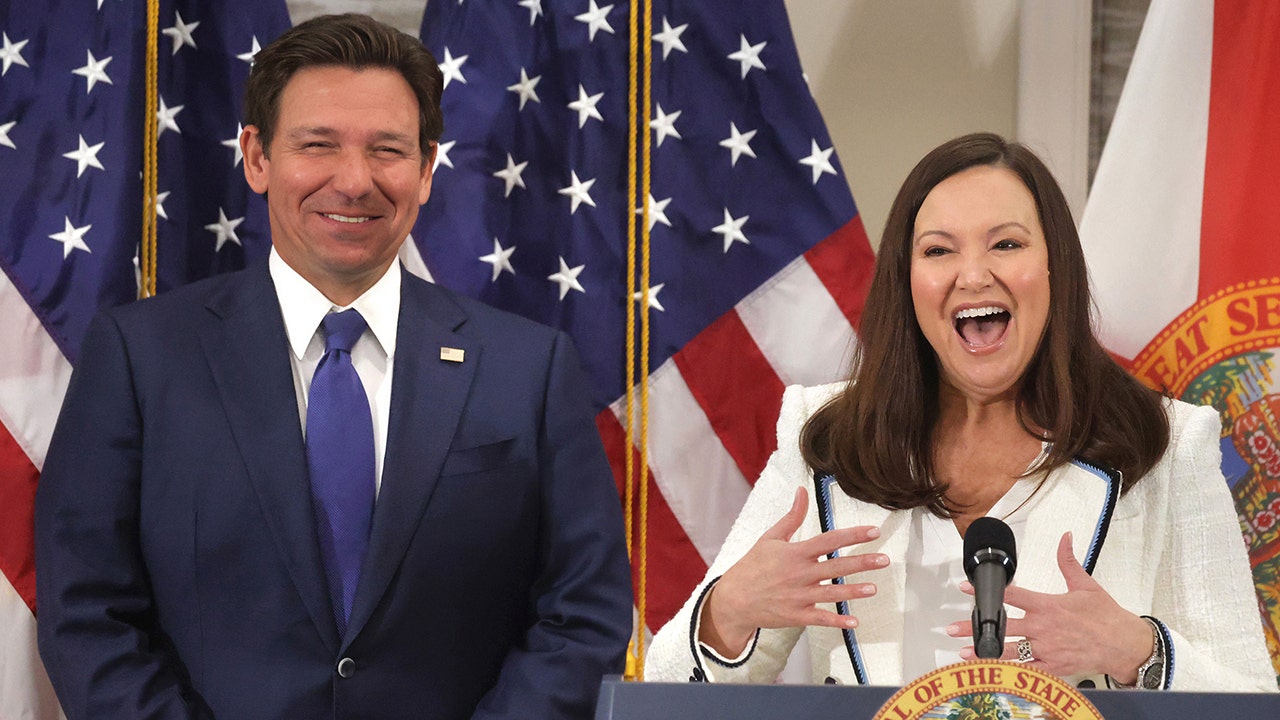Georgia
Georgia Is an Adventure Paradise Where Hiking Meets Khachapuri
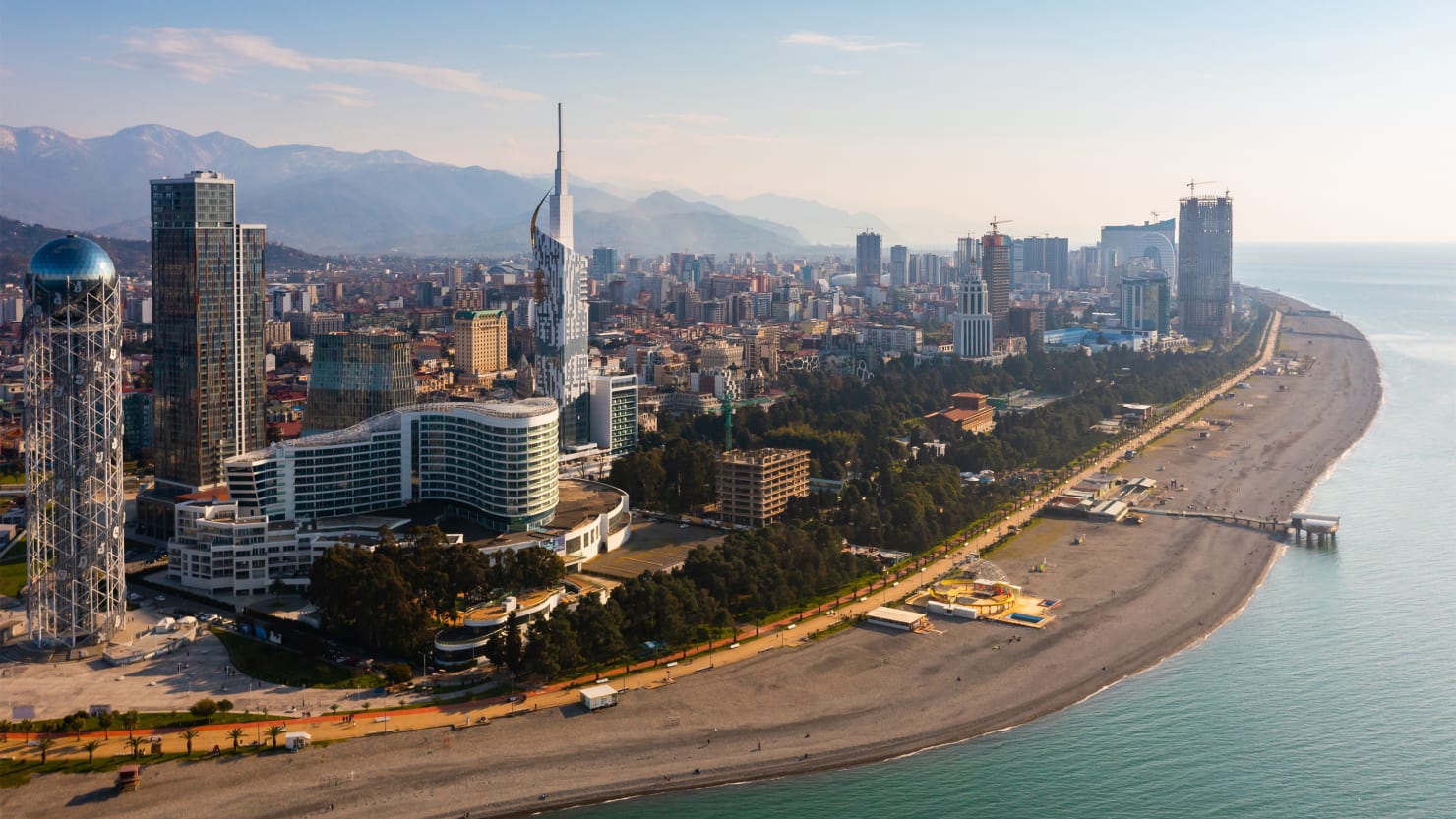
Where are the Caucasian snowcocks? For two hours, we’d been hunched over our telescopes, teeth chattering like jackhammers on the snowy slopes of the Greater Caucasus as we waited for the elusive gray gamebird to make an appearance. Awake since 4 a.m., our patience was wearing thin. “Chacha break!” shouted our guide, Dachi Shoshitashvili, whipping out an old water bottle filled with 140-proof Georgian moonshine.
Gut-warming shots before sunrise, an entire mountain to yourself, a bird guide who knows the Caucasus wilderness like his backyard (yet isn’t the least bit pedantic about it)—these are a few of the many perks of adventure travel in Georgia, which encompasses skiing, canyoning, parasailing, fly-fishing, RVing in refurbished Soviet vans, and much, much more… And we haven’t even talked about the prices yet.
For nearly a decade I’ve been visiting Georgia to report on everything from ancient winemaking traditions to blood-curdling ghost towns to the last truly wild place in Europe. But nothing prepared me for what I found when I started researching Georgian adventure travel: Here was a place where you could be jet-skiing in the Black Sea one day and heli-skiing down glaciated peaks the next—all in a country roughly the size of South Carolina. Georgia is one of Europe’s most intriguing outdoor destinations, and nobody seems to be talking about it.
But the thing about planning an outdoor adventure to Georgia—instead of one focused on, say, wine tasting or monastery hopping—is that seasonality is key. Many areas are snowbound and inaccessible for over half of the year, while others, like the watersport Eden of Batumi, are bleak and humdrum in the off season. Knowing when to go is half the story.
Spring: Rafting, Biking, and Canyoning
Over the last month, I’ve been watching the waterfall outside my window in Tbilisi go from trickle to torrent, splashing unsuspecting tourists with ice-cold water. This time of year, snowmelt from the high Caucasus sends water rushing down rocky rivulets into the lowlands—making for terrific kayaking and whitewater rafting. I learned this firsthand at Jomadia Rafting Camp in south central Georgia, where you can show up, no booking required, and within minutes be tumbling down rapids on a six-person boat with a guide at the helm. (Bonus: The camp is situated on the way to the fairytale cave city of Vardzia.) The experience was thrilling enough to get my adrenaline pumping but still felt totally safe, even though I was a newbie.
Vardzia cave monastery site in southern Georgia.
Westend61/Getty Images
Now that I’ve cut my teeth, next spring I’ll be seeking out faster, steeper rapids. By all accounts, adventure guide Mamuka Burduli is the guy to call—he’s known for intrepid excursions down the Rioni River (near the western city of Kutaisi, which has its own airport).
But there are plenty of rafting options closer to Tbilisi, too. Friends I trust clued me in on two solid (if somewhat slower and more meandering) excursions an hour’s drive north from the capital: Rafting Camp and Aragvi Rafting, both located near the khinkali mecca of Pasanauri. It’s hard to beat ending a day on the river with hand-pleated soup dumplings and cold Georgian beer overlooking the Aragvi.
Jomadia (where I braved my first rapids) sits at the edge of the Borjomi Nature Reserve, a 4,019-square-mile park known for its therapeutic springs and leafy rolling mountains veined with paths ideally suited to mountain biking. The fan favorite is the No. 6 Footprint Trail, which starts in Likani village and climbs some 2,600 feet to a panoramic viewpoint. Before venturing up into the mountains (Georiders will get you sorted) to ride past glaciers in Kazbegi on the Russian border, to take in one of Europe’s oldest settlements in Svaneti in the country’s northwest, or otherwise, consider starting with a dry run in the hills above Tbilisi. A number of easy trails offer splendid views over the city’s conical-domed churches and Soviet-era apartment blocks.
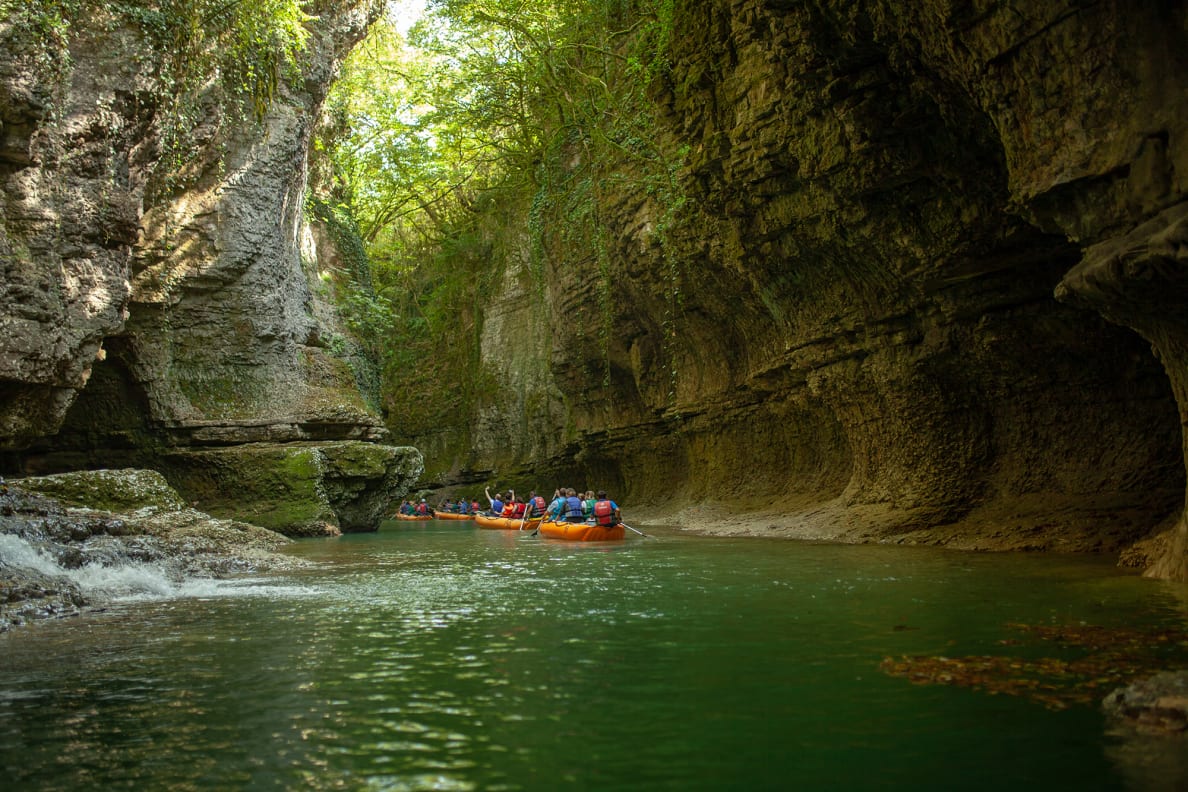
People rafting through a canyon in Martvili, Georgia.
andreonegin/Getty Images
Georgia’s Caucasus mountains have also been drawing an ever-growing number of canyoning enthusiasts, who call on CIC-certified guides like Giorgi Enukidze of Georgian Canyoning to rappel down fast-flowing streams and waterfalls in the bowels of valleys in northwestern Georgia like Tkhopra, Dzmuisi, and Sopo. And unlike similar canyons in the U.S. and Europe, in Georgia you seldom cross paths with other hikers and canyoneers.
Summer: Fly Fishing, RVing, Water Sports, Trekking
Fly fishing hasn’t caught on in Georgia—yet—despite the country being a prime destination for the sport: Crystal-clear rivers abound, and many are teeming with feisty brown trout. Shota Jokhadze (info@flyfishing.ge), the country’s top guide for recreational angling, is a walking GPS. He knows all the best fishing holes, which come alive especially in summer when the trout are at their most voracious. Multiday adventures with Shota into the protected nature area of Tusheti will have you camping in the Caucasian wilderness and cooking over live fire, though shorter trips (rods, waders, and gear included) are bookable, too.
But I have to be honest—I think I’ve been too corrupted by city life to enjoy standing and casting in the stillness of nature for long stretches of time. To me, a more appealing way to explore Georgia’s remote reaches is by RV. Enter Overlando, a tour company that stands out for its fleet of old-school Buhanka campervans refitted with 4G WiFi hotspots, JBL speakers, and all the cookware and bedding you need for a comfortable escape. Beyond the Buhanka’s Insta-chic Soviet kitschiness, the van is also practical for Georgia’s bumpy back roads, thanks to its high clearance, four-wheel drive, and narrow silhouette. (An aside: If I were a kid, I’d kill to sleep in the attachable rooftop tent, which ups the van’s capacity to four.)
RVing is best in summer, when you’re less likely to get rained on or stuck in the mud. But Georgia has lots going on for those who actually want to get wet. In the subtropical Black Sea city of Batumi, near the Turkish border, it’s impossible to walk down the four-mile-long boardwalk without getting accosted by buff dudes renting water scooters, wakeboards, paddle boards, and parasailing excursions—all great ways to take in sweeping views of the port’s rock beaches and flamboyant, Vegas-like skyline.
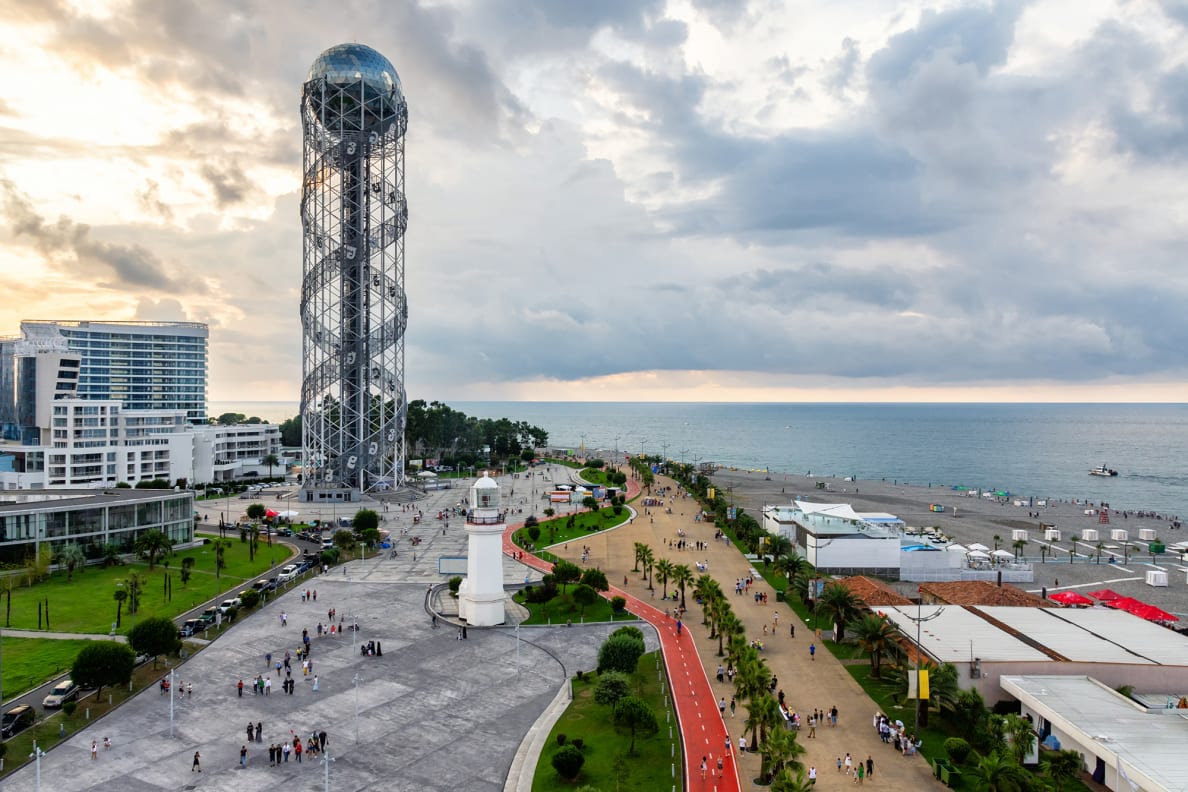
The beach boardwalk in Batumi along the Black Sea coast.
Andrii Marushchynets/Getty Images
Yet of all Georgia’s outdoor attractions, the most popular is trekking. After all, the country is home to four of Europe’s eight highest mountains. Three of those (Ushba, Tetnuldi, and Shkhara) are found in the northwestern region of Svaneti, known for one of the world’s most scenic hikes, from Mestia to Ushguli. The four-day, 36-mile route winds between turquoise lakes and lost-in-time villages and ends at a UNESCO-protected medieval enclave believed to be the highest continuously inhabited settlement in Europe. Happily there’s no need to pack a tent—the move here is to crash is at rustic guest houses where you’ll refuel nightly with hearty local dishes like kubdari (meat-filled flatbread redolent of fenugreek and mountain thyme) and chvishtari (cheesy fried corn cakes). Svaneti is buried under snow in winter and muddy in the spring, so summer (or early autumn) is the optimal time to visit.
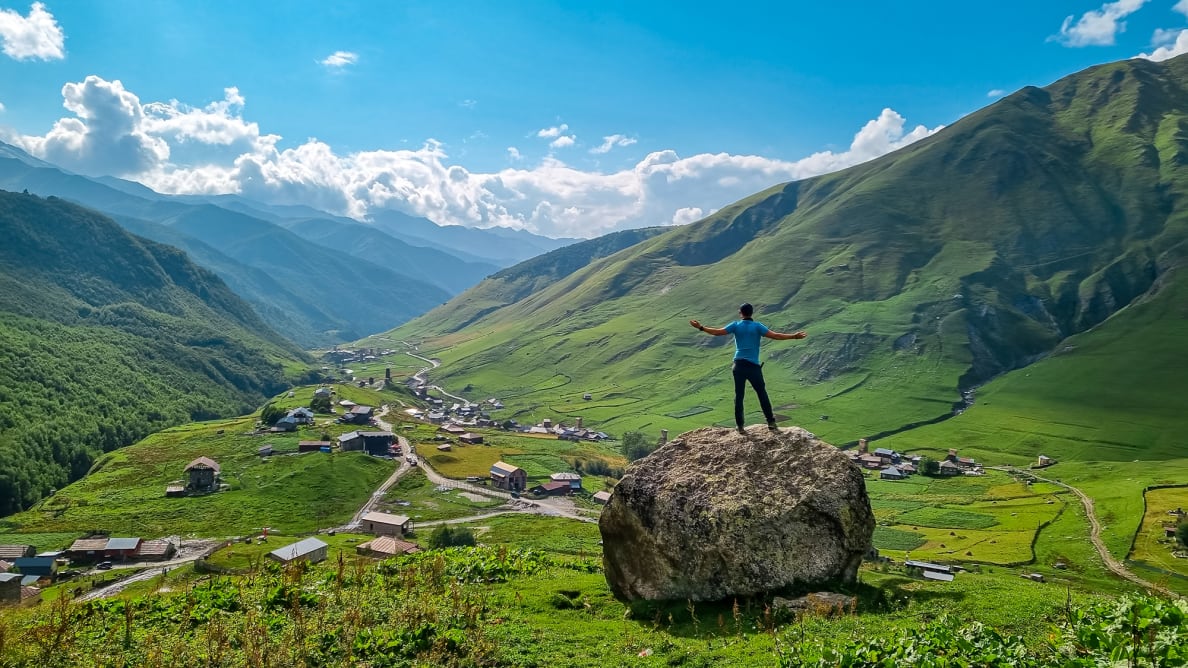
Hiking above the village Ushguli, near the Shkhara Glacier in the Greater Caucasus Mountains in the Svaneti Region of Georgia.
Christopher Moswitzer/Getty Images
Fall: Bird Watching, Horseback Riding, Winemaking
Every fall, Georgia plays host to one of nature’s most awe-inspiring spectacles: the autumn bird migration from Europe to Africa. Millions of birds—storks, raptors, flamingos, warblers, swallows, flycatchers, and more—make a temporary home in the Caucasus from (roughly) August to October as they move to warmer climes in search of food and safe breeding grounds. And yet, not only is the bird-watching community in Georgia relatively small; all but the most avid switchers are unaware of the country’s avian riches.
On a mission to change that is Dachi (dachi.shoshitashvili.1@iliauni.edu.ge), the snowcock whisperer we met earlier whom you could call Georgia’s premier bird nerd. Dachi spends most of the year on the road leading small groups of hardcore birders, helping them complete their life lists with Georgia’s “Big Five”: Caucasian grouse, great rosefinch, white-winged redstart, mountain chiffchaff, and—yes—those vexingly coy Caucasian snowcocks. Beyond the holy-grail species, there are more than 400 types of birds you can spot in Georgia, and spring is primetime. “This time of year, you can spot up to 200 different species on a single trip,” Dachi told me, adding that visiting bird lovers can help local conservation efforts by monitoring birds with Batumi Raptor Count, an indispensable nonprofit.
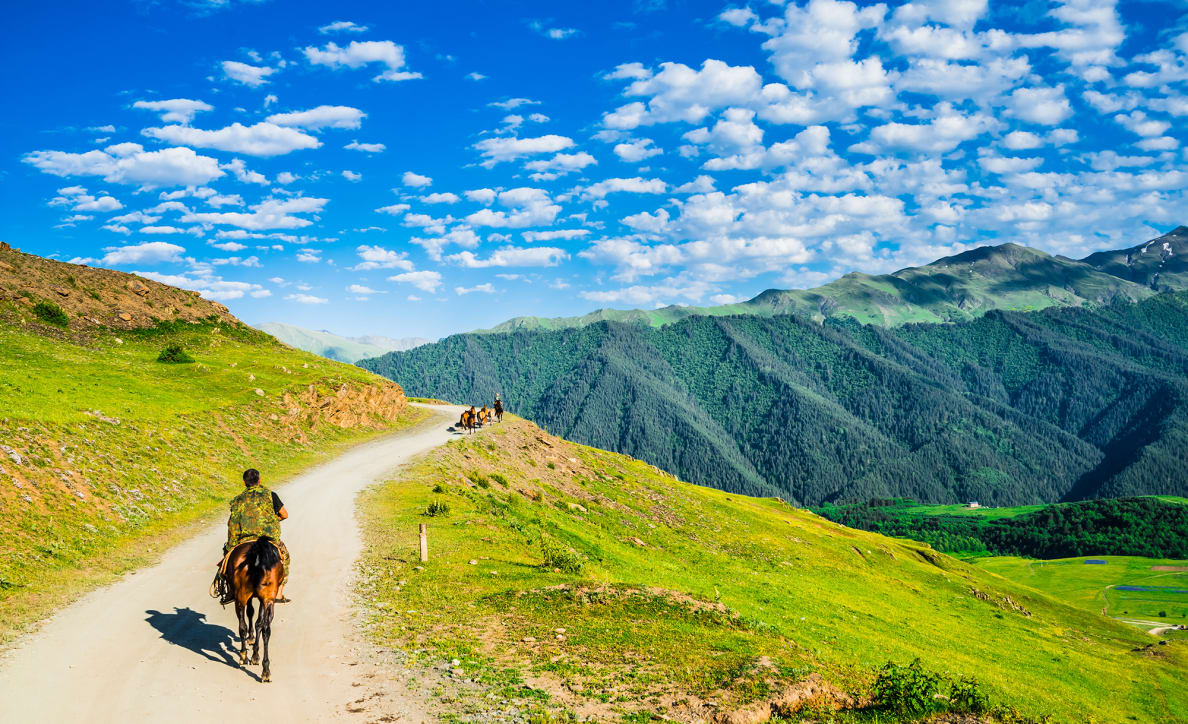
Horse trekking in the mountains of Tusheti, Georgia.
StreetFlash/Getty Images
But birds aren’t the only animals migrating in Georgia come autumn: October also marks the annual transhumance of horses in Tusheti. Tusheti is a protected nature reserve and one of the remotest corners of Europe—it takes several hours of off-road driving to get there, a journey the BBC once called one of the most dangerous in the world. But those who visit are rewarded with stuck-in-time stone villages inhabited by rugged, welcoming locals who practice pagan-influenced Christianity and speak an ancient dialect of Georgian.
Horses remain the main form of transportation in Tusheti, but like most of the region’s inhabitants, the horses have to get out of Dodge before heavy snow and near isolation make Tusheti all but unlivable. That’s where Tinatin Ididze comes in. A Tusheti native, Tinatin each year embarks on an epic equestrian adventure that moves the horses down from the high mountain pastures of Tusheti to the scrubby grasslands of Vashlovani, near the Azerbaijan border, where the horses roam freely until the following spring. Intrepid horse riders, listen close: Tinatin takes a handful of tourists along for what I can only imagine is the ride of a lifetime. (Those less inclined to rough it can also hire Tinatin, who is certified in equestrian tourism, for all sorts of horseback riding itineraries.)
While Tinatin is busy rounding up the horses in the highlands, Georgians elsewhere are consumed by one of the country’s most coveted celebrations: rtveli, the annual grape harvest. Georgia lays claim to the world’s oldest winemaking tradition, dating back to 5900 B.C., some 2,500 years before the invention of the wheel. But it’s not all chichi swirling and sipping in Georgian wine country—you can actually pick and stomp grapes here. With a bit of advance notice, wineries like Andronikashvilis Marani (levan@marani.organic) and Nikalas Marani will let you pick and press ancient Georgian grapes you’ve probably never heard of such as rkatsiteli, kisi, and saperavi. And after a hard day’s work, you’ll sit down to a wine-soaked supra (Georgian feast) fit for the gods.
Winter: Skiing and Snowboarding
At Zermatt in Switzerland, a one-day ski pass costs around $100. At Gudauri, Georgia’s most popular ski resort, that ticket will set you back a mere $27. The math doesn’t lie—even when you account for the difference in airfare, Georgia beats the Alps almost every time when it comes to affordable ski vacations. And I don’t know about your après-ski preferences, but I’ll take gooey khachapuri, lavash-swaddled kebabs, and slurpable soup dumplings any day over potatoes and fondue.
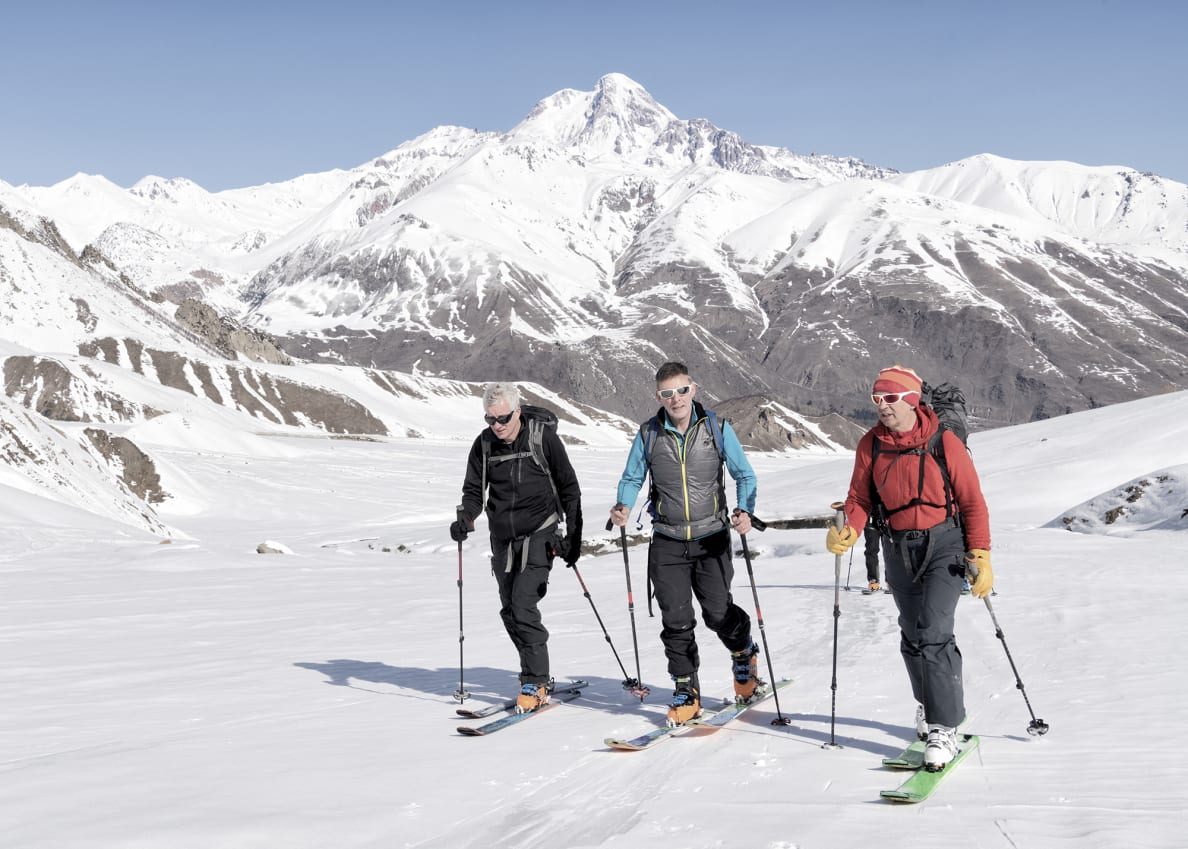
People on a ski tour in Gudauri, Georgia.
Getty Images
Just two hours from Tbilisi by car, Gudauri—a mountain resort high above the treeline with a number of ski-in-ski-out hotels—is Georgia’s most universally appealing ski resort. Why? It boasts 44 miles of pistes, English-speaking ski instructors, and a new cable car connecting it all to the town of Stepantsminda (known for the staggeringly gorgeous Gergeti Church and the luxurious hideaway of Rooms Kazbegi). When I visited a couple years ago, I wound up kicking back chacha shots and dancing to reggaeton with some Germans I met in the cafeteria. There’s nothing pretentious or exclusive about Gudauri—and that’s precisely why it’s my favorite ski resort.
But for adrenaline-loving skiers and boarders who slalom down black diamonds without a hitch, there may be no more spirit-freeing bucket-list experience than a day spent heliskiing. It’s exactly what it sounds like: A helicopter whisks you up to an unspoiled, un-skied mountaintop in an alpine no man’s land, then (alongside a certified guide) you ski down perfect powder to the base of the mountain, where you do it all again. If you’re thinking, “I’m definitely not rich enough for this,” consider that in Georgia, heliski runs start at $220 per person (a six-run package costs $820). According to the Georgia National Tourism Administration, the safest, most experienced heliski company is Heliski Georgia.

Georgia
Giuliani settles legal fight with former Georgia election workers and agrees to stop defaming them

WASHINGTON, DC – MAY 19: Former New York City Mayor and former personal lawyer for former President Donald Trump Rudy Giuliani talks to members of the press before he leaves the U.S. District Court on May 19, 2023 in Washington, DC. Giuliani is sued
NEW YORK – Rudy Giuliani reached a deal Thursday that lets the cash-strapped ex-New York City mayor keep his homes and belongings, including prized World Series rings.
The deal was in exchange for unspecified compensation and a promise to never again speak ill of two former Georgia elections workers who won a $148 million defamation judgment against him.
Giuliani’s legal trouble
The backstory:
Rudy Giuliani, once known as “America’s Mayor” for his leadership after 9/11, faced legal challenges after serving as President Trump’s personal attorney.
Following the 2020 election, Giuliani made false claims about two Georgia election workers, Ruby Freeman and Wandrea “Shaye” Moss, leading to a $148 million defamation judgment against him.
Giuliani’s settlement
What we know:
Giuliani reached a settlement allowing him to keep his homes and World Series rings in exchange for unspecified compensation and a promise not to defame Freeman and Moss again.
The agreement resolves all pending litigation and cancels a trial that was set to determine the ownership of his Florida condominium and rings.
Giuliani stated that the settlement “does not involve an admission of liability or wrongdoing.”
What does Freeman, Moss get?
What we don’t know:
The specifics of the settlement, including the amount Giuliani agreed to pay Freeman and Moss, remain undisclosed.
It is unclear how Giuliani is financing the settlement or if he has any assistance in doing so.
Giuliani’s legal troubles unfolded
Timeline:
Giuliani filed for bankruptcy shortly after the defamation verdict, pausing collection efforts.
Last week, a judge found Giuliani in contempt for failing to disclose information about his assets.
The settlement was reached after three days of negotiations, just before a trial was set to begin.
Freeman, Moss react
What they’re saying:
FFreeman and Moss expressed relief, stating, “The past four years have been a living nightmare… Today is a major milestone in our journey.”
Giuliani remarked, “This litigation has taken its toll on all parties,” and emphasized that no one deserves threats or harassment.
Chapter closed for Giuliani
What’s next:
With the settlement in place, Freeman and Moss can move forward with their lives.
Giuliani retains his assets and has agreed not to speak ill of the women again, marking a significant step in closing this chapter of his career.
The Source: This article is based on original reporting by the Associated Press. Associated Press writer Dave Collins contributed reporting.
Georgia
Educational Leader Walter Kimbrough to speak at Georgia Southern University’s MLK Celebration Jan. 17 | Newsroom

Renowned speaker and higher education leader Walter Kimbrough, Ph.D., will deliver the keynote address at Georgia Southern University’s celebration of Rev. Martin Luther King Jr.’s life and legacy on Friday, Jan. 17.
“Dr. Kimbrough is an established leader in higher education and has recently emerged as a voice on free speech, which is a timely topic and a hallmark of campuses of higher education,” said Associate Vice President for Organizational Effectiveness, Leadership Development, and Inclusive Excellence, Dominique Quarles, Ph.D. “I am excited to have Dr. Kimbrough, someone who has served as a college president for two decades, discuss the challenges and importance of free speech within our community.”
A champion for student success and economic development for historically Black colleges and universities, Kimbrough has served in student affairs roles at Emory University, Georgia State University, Old Dominion University and Albany State University, among others. He was named the 12th president of Philander Smith College in 2004. In 2012, he became the 7th president of Dillard University in New Orleans, Louisiana, where he served for 10 years. Presently, he serves as the interim president of Talladega College.
“Being asked to give a Martin Luther King, Jr. address is one of the engagements I accept with the deepest humility because it is an awesome responsibility,” said Kimbrough. “It is an opportunity to place in context the work of Dr. King which has been watered down to predictable sound bites, sharing parts of his work we never mention.”
Georgia Southern’s celebration of King’s legacy is open to the University community. The breakfast celebration event will be held on the Statesboro Campus at 8:30 a.m. in the Williams Center Multipurpose Room. The lunch celebration will be held on the Armstrong Campus in Savannah in the Armstrong Center Ballroom at 12:30 p.m.
Georgia Southern students are also encouraged to attend the King Holiday Celebration Parade in Statesboro Jan. 18, as well as the Dr. Martin Luther King Jr. Annual Parade in Savannah Jan. 20.
Georgia
Georgia Southern senior wins research poster award, heading to Denmark for solar panel study | Newsroom

When the power goes out during a storm, there’s a team with a Georgia Southern University student at the Georgia Transmission Corporation (GTC) responsible for looking into what happened. Elizabeth Sills, a computer and electrical engineering senior from Savannah works in the system reliability department for the GTC.engin
“If there’s an outage and they don’t know what caused it, I’ll run a lightning study to see if there’s lightning in the area,” said Sills. “Then, for example, I’ll send out an email saying it was a negative five kilovolt bolt. That way when the field guys go out, they know what to expect.”
Sills hasn’t just been working on the reliability of current power grids, but is also working to bolster the reliability of future power sources. During the previous semester, she had been intrigued by the possibility of contributing to solar energy advancements. As part of an electric engineering course, she tested the strength and longevity of solar panels in various climates and other elements.
Sills noted climate conditions can also impact how much technology can be added onto a solar panel to increase efficiencies or margins of error.
“There are different types of solar panels,” she said. “Some of them can rotate. So if the sun’s coming up, the panel will face the sun and then it will rotate with it. Some can also swivel, and there are some that can bend 90 degrees. If you get the whole range of motion, it’s more likely that more parts will fail.”
Her findings revealed that panels kept in temperatures between 30°F and 86°F significantly extended the lifespan of the solar panels. This information is critical for the expansion of their use across the globe.
Her work has even garnered international attention.
Sills was invited to be part of a small research team going to Denmark over the next summer to continue her research into solar panels and their utilization. Her research team is made up of five other students from across the U.S. and is supported through funding from the National Science Foundation.

“Most of the research in this area is now over in Europe,” she said. “They have different transformer models and a whole different grid over there. We want to see if we can bring it to America and still be able to use the same functions.”
This isn’t her first accolade in this field of study.
More recently, Sills brought a statewide award back to Eagle Nation. Last fall, she participated in the Georgia Undergraduate Research Conference, hosted by Oxford College of Emory University. Out of 80 competitors from across Georgia, her research on power converters in solar panels won the “Outstanding Poster” award. Sills’ award-winning research revealed new possibilities that can assist with the reliability of power electronic converters, ensuring solar panels function efficiently under temperature and stress.
“I was excited,” Sills said. “It was my first ever competition for research posters or anything of that nature so I didn’t know what to expect. It was very surprising.”
-
/cdn.vox-cdn.com/uploads/chorus_asset/file/25822586/STK169_ZUCKERBERG_MAGA_STKS491_CVIRGINIA_A.jpg)
/cdn.vox-cdn.com/uploads/chorus_asset/file/25822586/STK169_ZUCKERBERG_MAGA_STKS491_CVIRGINIA_A.jpg) Technology1 week ago
Technology1 week agoMeta is highlighting a splintering global approach to online speech
-

 Science6 days ago
Science6 days agoMetro will offer free rides in L.A. through Sunday due to fires
-
/cdn.vox-cdn.com/uploads/chorus_asset/file/25821992/videoframe_720397.png)
/cdn.vox-cdn.com/uploads/chorus_asset/file/25821992/videoframe_720397.png) Technology1 week ago
Technology1 week agoLas Vegas police release ChatGPT logs from the suspect in the Cybertruck explosion
-

 News1 week ago
News1 week agoPhotos: Pacific Palisades Wildfire Engulfs Homes in an L.A. Neighborhood
-

 Education1 week ago
Education1 week agoFour Fraternity Members Charged After a Pledge Is Set on Fire
-

 Business1 week ago
Business1 week agoMeta Drops Rules Protecting LGBTQ Community as Part of Content Moderation Overhaul
-

 Politics1 week ago
Politics1 week agoTrump trolls Canada again, shares map with country as part of US: 'Oh Canada!'
-
/cdn.vox-cdn.com/uploads/chorus_asset/file/23935558/acastro_STK103__01.jpg)
/cdn.vox-cdn.com/uploads/chorus_asset/file/23935558/acastro_STK103__01.jpg) Technology5 days ago
Technology5 days agoAmazon Prime will shut down its clothing try-on program




